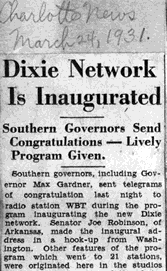


![]()
![]()
Southern governors, including Governor Max Gardner, sent telegrams of congratulation last night to radio station WBT during the program inaugurating the new Dixie network. Senator Joe Robinson, of Arkansas, made the inaugural address in a hook-up from Washington. Other features of the program which went to 21 stations, were originated here in the studios which will be the key of the chain.
Officials of the Columbia network were here for the program. They were Jesse S. Butcher, director of public relations, Julius Seebach, director, program operations, Edwin K. Cohan, technical director.
The plan is to broadcast only evening programs over the network for the present. Some National leaders will speak once each week.
Governors John Garland Pollard, of Virginia: R. S. Sterling, of Texas, Henry H. Horton, of Tennessee; Theo G. Bilbo, of Mississippi; B. M. Miller, of Alabama; Harvey Parnell, of Arkansas; Lieutenant-Governor Robert Burns, of Oklahoma, sent telegrams.
The program included Dixie salon Orchestra, directed by Michael Wise; the Buccaneers male quartet; vocal numbers by Jules Dow, James Moore, Joan Gottheimer; Southland Singers of Johnson C. Smith negro university, Ronald Jenkins announced.
![]()
The Dixie network of 21 southern radio stations was inaugurated last night with Charlotte's station WBT as the key station of the hook-up, which is the fourth largest circuit in the United States.
Senator Joe Robinson of Arkansas, fighting minority leader of the United States senate, made the inaugural address, and in a five-minute speech from Washington discussed the great advantages that should come to the south with the creation of the new network.
OFFICIALS ARE PRESENT.
With the exception of Senator Robinson's address, the entire one-hour network program originated in the studios of WBT on the sixth floor of the Wilder building. The program went off with a dash and spontaneity that were particularly gratifying to the station and to Columbia Broadcasting system officials. Here for the inauguration of the new chain were Jesse Butcher of New York, national publicity director for the Columbia system, and reporters from Atlanta and other southern cities.
Interspersed through the program were messages of congratulation from the various southern governors, headed by Governor Gardner of North Carolina. During the short pauses for station announcements the orchestra gave a spirited dash of "Dixie."
WEEKLY SPEECHES PLANNED.
The programs for the network will be planned and broadcast from WBT, it was announced last night. Once each week, according to plans, some national leader will broadcast from the national capital. WBT officials throughout the broadcasting received messages from various sections of the south congratulating the Columbia system's initiative in inaugurating the new regional hookup.
The Dixie network includes 21 stations and is affiliated with the Columbia Broadcasting system. it is the largest regional network in the United States.
For the present, it was announced, will be only evening programs. Some of the artists and bands that will participate include those on last night's program and the Dixie Serenaders, the Merrymakers, the Modernists, and Billy Hamilton and his Southern Syncopaters, all of which are local musical organizations.
The first program of the new Dixie network follows:
Dixie Salon orchestra under the direction of Michael Wise.
The Buccaneers' male quartet.
Inaugural address a by Senator Joseph T. Robinson of Arkansas, speaking from Washington, D. C.
Acknowledgment of messages if congratulation from Governors 0. Max Gardner of North Carolina, John Garland Pollard of Virginia, R. S. Sterling of Texas, Henry H. Horton of Tennessee, Theo G. Bilbo of Mississippi, B. M. Miller of Alabama, Harvey Parnell of Arkansas, and Lieut. Gov. Robert Burns of Oklahoma.
Vocal numbers by Jules Dow, baritone; James Moore, tenor, and Joan Gottheimer, soprano. Selections by Southland Singers of Johnson C. Smith university. The program was announced by Ron Jenkins.
Among the distinguished guests present were: Jesse S. Butcher, director of Public relations, Columbia Broadcasting system; Julius Seebach, director of program operations, Columbia system; Edwin K. Cohan, technical director of the system, all three of New York; and W. S. Key, and Harold Bell, newspapermen of Atlanta, Ga.